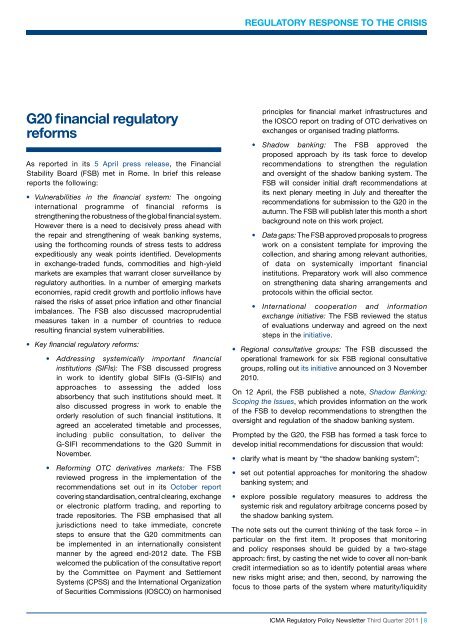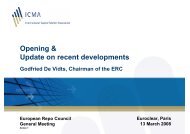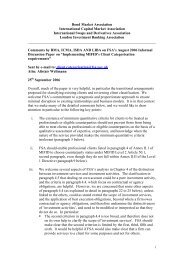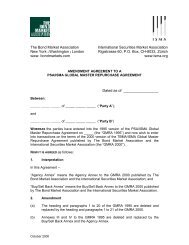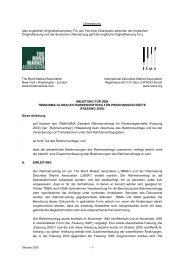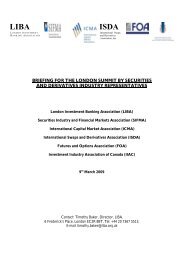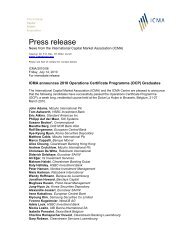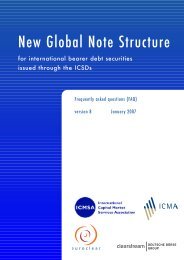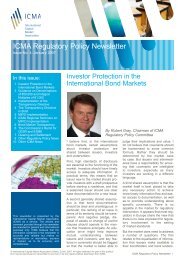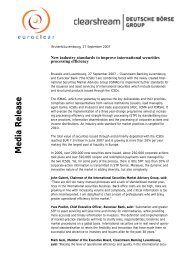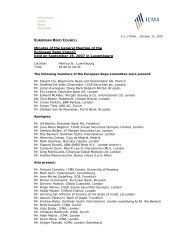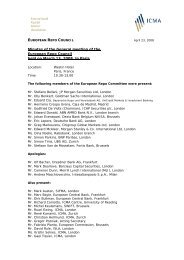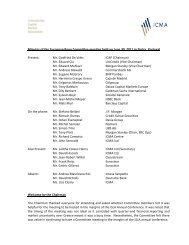Issue no. 22: ICMA Regulatory Policy Newsletter
Issue no. 22: ICMA Regulatory Policy Newsletter
Issue no. 22: ICMA Regulatory Policy Newsletter
You also want an ePaper? Increase the reach of your titles
YUMPU automatically turns print PDFs into web optimized ePapers that Google loves.
G20 financial regulatory<br />
reforms<br />
As reported in its 5 April press release, the Financial<br />
Stability Board (FSB) met in Rome. In brief this release<br />
reports the following:<br />
• Vulnerabilities in the financial system: The ongoing<br />
international programme of financial reforms is<br />
strengthening the robustness of the global financial system.<br />
However there is a need to decisively press ahead with<br />
the repair and strengthening of weak banking systems,<br />
using the forthcoming rounds of stress tests to address<br />
expeditiously any weak points identified. Developments<br />
in exchange-traded funds, commodities and high-yield<br />
markets are examples that warrant closer surveillance by<br />
regulatory authorities. In a number of emerging markets<br />
eco<strong>no</strong>mies, rapid credit growth and portfolio inflows have<br />
raised the risks of asset price inflation and other financial<br />
imbalances. The FSB also discussed macroprudential<br />
measures taken in a number of countries to reduce<br />
resulting financial system vulnerabilities.<br />
•<br />
Key financial regulatory reforms:<br />
•<br />
Addressing systemically important financial<br />
institutions (SIFIs): The FSB discussed progress<br />
in work to identify global SIFIs (G-SIFIs) and<br />
approaches to assessing the added loss<br />
absorbency that such institutions should meet. It<br />
also discussed progress in work to enable the<br />
orderly resolution of such financial institutions. It<br />
agreed an accelerated timetable and processes,<br />
including public consultation, to deliver the<br />
G-SIFI recommendations to the G20 Summit in<br />
November.<br />
• Reforming OTC derivatives markets: The FSB<br />
reviewed progress in the implementation of the<br />
recommendations set out in its October report<br />
covering standardisation, central clearing, exchange<br />
or electronic platform trading, and reporting to<br />
trade repositories. The FSB emphasised that all<br />
jurisdictions need to take immediate, concrete<br />
steps to ensure that the G20 commitments can<br />
be implemented in an internationally consistent<br />
manner by the agreed end-2012 date. The FSB<br />
welcomed the publication of the consultative report<br />
by the Committee on Payment and Settlement<br />
Systems (CPSS) and the International Organization<br />
of Securities Commissions (IOSCO) on harmonised<br />
REGULATORY RESPONSE TO THE CRISIS<br />
principles for financial market infrastructures and<br />
the IOSCO report on trading of OTC derivatives on<br />
exchanges or organised trading platforms.<br />
• Shadow banking: The FSB approved the<br />
proposed approach by its task force to develop<br />
recommendations to strengthen the regulation<br />
and oversight of the shadow banking system. The<br />
FSB will consider initial draft recommendations at<br />
its next plenary meeting in July and thereafter the<br />
recommendations for submission to the G20 in the<br />
autumn. The FSB will publish later this month a short<br />
background <strong>no</strong>te on this work project.<br />
• Data gaps: The FSB approved proposals to progress<br />
work on a consistent template for improving the<br />
collection, and sharing among relevant authorities,<br />
of data on systemically important financial<br />
institutions. Preparatory work will also commence<br />
on strengthening data sharing arrangements and<br />
protocols within the official sector.<br />
•<br />
International cooperation and information<br />
exchange initiative: The FSB reviewed the status<br />
of evaluations underway and agreed on the next<br />
steps in the initiative.<br />
• Regional consultative groups: The FSB discussed the<br />
operational framework for six FSB regional consultative<br />
groups, rolling out its initiative an<strong>no</strong>unced on 3 November<br />
2010.<br />
On 12 April, the FSB published a <strong>no</strong>te, Shadow Banking:<br />
Scoping the <strong>Issue</strong>s, which provides information on the work<br />
of the FSB to develop recommendations to strengthen the<br />
oversight and regulation of the shadow banking system.<br />
Prompted by the G20, the FSB has formed a task force to<br />
develop initial recommendations for discussion that would:<br />
•<br />
•<br />
clarify what is meant by “the shadow banking system”;<br />
set out potential approaches for monitoring the shadow<br />
banking system; and<br />
• explore possible regulatory measures to address the<br />
systemic risk and regulatory arbitrage concerns posed by<br />
the shadow banking system.<br />
The <strong>no</strong>te sets out the current thinking of the task force – in<br />
particular on the first item. It proposes that monitoring<br />
and policy responses should be guided by a two-stage<br />
approach: first, by casting the net wide to cover all <strong>no</strong>n-bank<br />
credit intermediation so as to identify potential areas where<br />
new risks might arise; and then, second, by narrowing the<br />
focus to those parts of the system where maturity/liquidity<br />
<strong>ICMA</strong> <strong>Regulatory</strong> <strong>Policy</strong> <strong>Newsletter</strong> Third Quarter 2011 | 8


